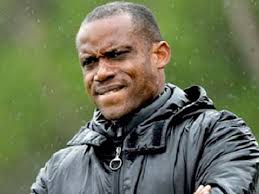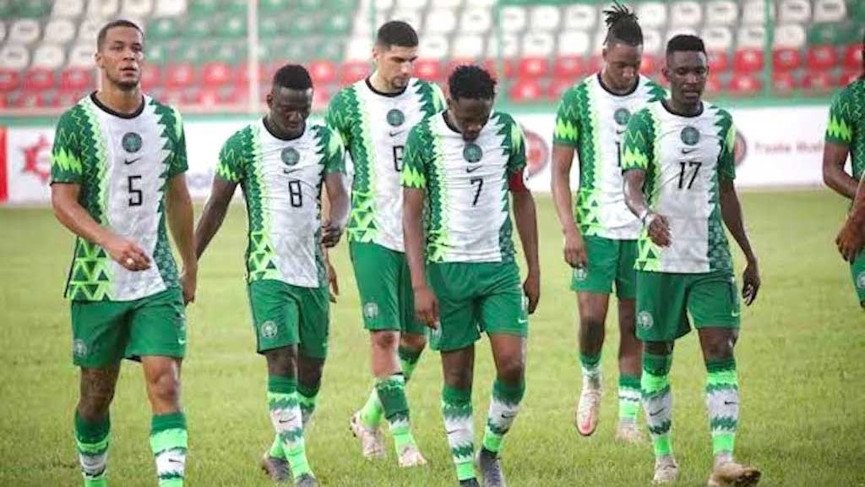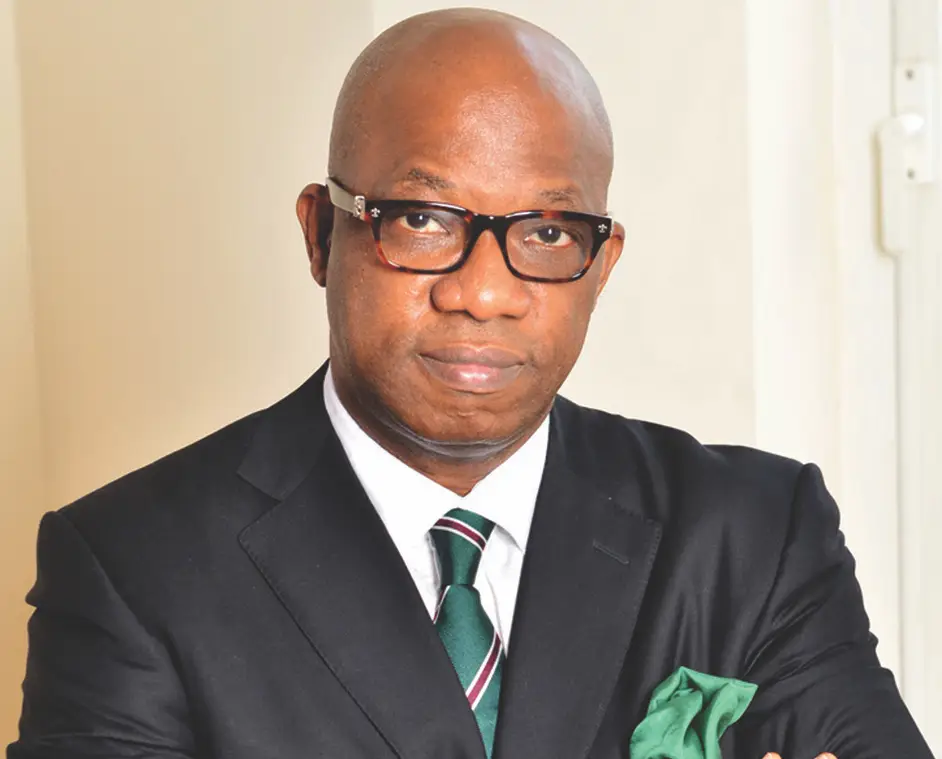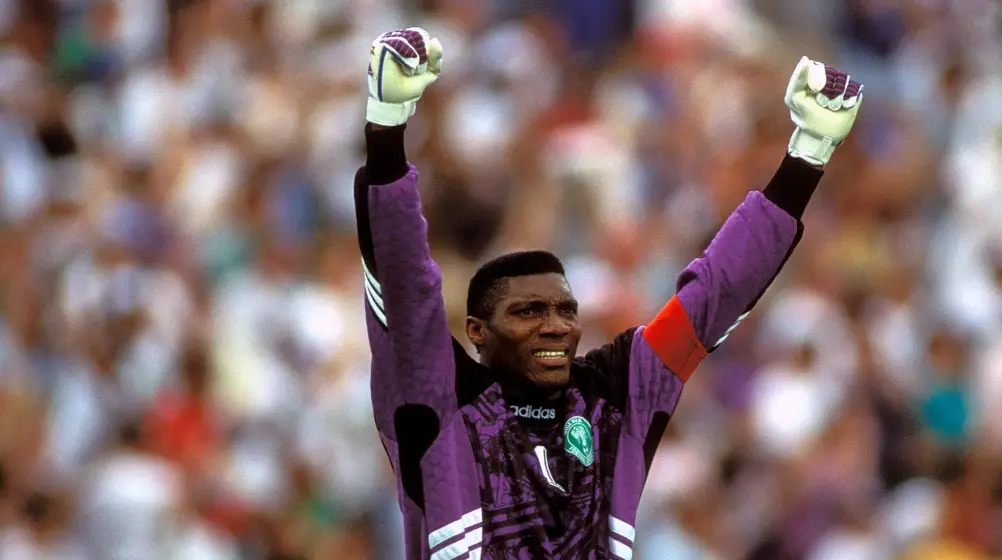Let me apologise for remaining on this subject matter this week when so many other great things are happening around the world of football that should attract better attention now than the rather over-flogged matter of the resignation of Sunday Oliseh as coach of Nigeria’s national football team.
I promise that this would be my last comment on it.
I asked some questions last week that were begging for answers without realizing that Oliseh himself would provide the answers on his blog which I later read.
By his own explanation I now know through his blog why he walked away from the job I have always claimed, even before he took it up, is the easiest and most lucrative in the world when you examine it critically – about 7 million Naira in total every month for living in Europe and occasionally working in Nigeria by assembling players for a few days at a time and playing matches that would be won more often than would be drawn or lost because of the vast superiority of Nigeria over most of Africa! The really crunchy matches are few and far between!
Here is a job that most people in the field with him would do anything to take for nothing or a small fraction of what he was offered – remuneration that even the President of the country does not earn, global respect and recognition, work in an industry he has excelled in and he has passion for, and opportunity to make history by managing, potentially, Africa’s strongest football team.
Now that I know why he left so unceremoniously I am even more baffled. That’s why I am remaining on the subject, but for only this final time.
To everyone that is not familiar with the Nigerian environment and with our well-established football traditions, Sunday’s explanations would be justified and acceptable.
For those of us that have lived and continue to survive in this complicated and unique environment something still lingers. Why did he take up this assignment in the first place?
The state of football and its administration has not changed since even before Clemens Westerhof. Westerhof once theorised that crisis are the elixir for success in Nigerian football. That without the chaos, confusion, crisis and poor administration Nigerian football would not succeed.
He often told stories of how he would willfully stir up trouble within the football system just so that the players can draw energy from it, prove everyone wrong, and win matches.
But reading Sunday’s blog I was shocked to read him cite disrespect, backlog of wages and allowances, breach of contract details, firing of his staff without his knowledge and lack of proper welfare for the players as reasons for his exit.
The history of coaching the Super Eagles is littered with all these same issues.
When some coaches even tell their own story it makes Oliseh’s reasons sound like a fairy tale.
Clemens Westerhof succeeded despite them by muscling his way to the top level of the Nigerian government. He climbed over mountains of challenges that the system posed every inch of the way. He converted the threats of the challenges into weapons of success.
He learned to understand the psyche of Nigerians and masterfully found a way of dealing with everyone, including the very hard-to-deal-with players. This ability paved the way for his monumental success.
Even when he finally abandoned the team in the US in frustration following deep divisions and disagreements with the players and the officials on the eve of Nigeria’s greatest moment in football, he did so only because his contract expired with the last kick of the ball. He did not quit when the going was tough and rough.
Take the case of Stephen Keshi who learnt well from Westerhof’s example.
So much murk was hurled his way that could have frustrated him into quitting a day after he took the job but he took it all in his stride and shut everyone up by winning trophies (the Africa Cup of Nations and qualifying for the World Cup). Even when he first resigned he did so strategically after winning the African Cup. He was begged to return. That’s the power of succeeding first, not minding how it is earned.
So, coaching Nigerian football had always been a pressure-cooker affair, characterized by endless bickering and internal crisis, and fueled by a critical media and a Nigerian audience of football followers that always demand victory regardless of the circumstances under which a coach works or the team plays! No excuse is good enough to reduce people’s expectation!
Sunday Oliseh grew up, was nurtured and flourished in this environment. He knows it well like the back of his hand. He was, indeed, actively involved more than most of his colleagues in agitating and demanding for better treatment of Nigerian players, even to the extent of been labeled a tempestuous non-conformist and a radical.
That’s why even with his contributions to the evolution of probably Nigeria’s greatest team ever, he was not the most courted amongst the players of his generation after retiring from the game.
That’s why it took so long for Nigerian football to look in his direction when the country wanted a new generation of coaches to take over from the older ‘failed’ generation and to shape the future of Nigerian football.
That’s why the country leaned towards Eguaveon, Keshi, and Siasia and only reluctantly gave him a chance when there was no one else in the picture, and a few respected commentators justified giving him a chance and reminding everyone of his intellect, his analytical ability, his qualifications, his wide experiences as a player and the belief that as a now more mature Oliseh time must have been tempered his previous tempestuous and impatient nature. I believed he knew and would manage the pressures, criticisms and myriad of shortcomings that come with working and succeeding in Nigeria!
Nigeria has not become a different country since Oliseh retired from football and went into other things. He is a very smart guy. He knew what he was going into taking the job. He knew he would never be able to change Nigeria and the system that was there even before he was born and under which he himself grew, was nurtured and that gave him the platform to succeed.
He even knew he was inheriting a team that was low in spirit, in motivation and short on quality players. He knew he would have to fight against federation officials that have never understood the sensibilities of players and never met all the demands of previous coaches. He knew he would have to meet the expectations of Nigerians that have no compassion for coaches that do not produce instant results by winning ALL matches!
I would be disappointed to think that Sunday Oliseh, with all his intellect, did not know he was going into an oven by accepting to coach the Super Eagles of Nigeria.
He knew all these things and yet took the job. That’s my point.
He should NEVER have taken up the job in the first place if he was not prepared to live with the well-established football ‘traditions’ within which every coach before him had worked and some had succeeded.
Now that I know that he had no other reasons different from what he listed I will rest my case and stop searching for other reasons why he would unceremoniously resign from the easiest and one of the most lucrative and prestigious jobs in the world.
I welcome him back into our fold of writers, analysts, commentators and critics, a safe confine that allows us the freedom to ask of others what we ourselves are unable to deliver when given the opportunity.








I watched the latest video where Sunday Oliseh attempted to justify his claims for resigning. Like you, I do not see any justifiable reasons for giving a job that promises to make larger than himself if he succeeds. Oliseh, the messiah, failed to see the “big picture.” He failed to be the one to correct the wrongs in the NFF. He failed to understand Nigerian history, NFF history and the Nigerian culture. He failed to inspire younger generations. My generation can dwell on lessons not learned and what opportunities this presents. I hope that he sincerely reveal what we already know about fraud, corruption, and mismanagement in NFF and the revelation will engender a reexamination of all sports federations in Nigeria in terms coaches and players’ welfare. The change sports need can now begin with an investigation of the workings in sports federations.